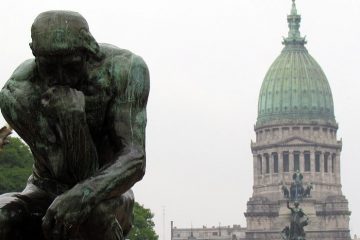
A Race Against Time: The Public Safety Crisis in Brazil
According to a recent national survey on crime and victimisation in Brazil, more than fifty per cent of respondents reported having been robbed at least once, while 85 per cent know at least one other person who has been victim of the same crime. Latinobarómetro data from 2023 shows that 59 per cent of Brazilian respondents are worried “all the time” about becoming a crime victim. Such alarming numbers are just the tip of the iceberg when it comes to crime and violence in the largest country in the Southern hemisphere. Results from the most recent National Transport Confederation (Conferederação Brasileira do Transporte, CNT) national poll conducted in mid-January 2024 clearly indicate public safety as the major challenge to be …
OxPol Blogcast Episode 4: Mexico’s Midterm Election
Welcome to the OxPol Blogcast, a podcast where we will be sharing research, analysis, and experiences from members of the University of Oxford’s Department of Politics and International Relations. On each, episode we will talk to a guest about a piece they’ve written for the OxPol Blog. Then, we’ll discuss their larger research agenda, their insights on conducting political science, and their time at Oxford. On this episode of the OxPol BlogCast, host Chase Harrison talks to DPhil student Javier Pérez Sandoval about Mexico’s upcoming midterm election, theories of voter choices, and analysing democracy at the subnational level. Read the original blog post here: https://blog.politics.ox.ac.uk/a-return-to-the-right-for-mexico-foucaults-pendulum-and-missed-political-opportunities/ Views expressed on this podcasts are those of the guests alone and are not representative of …
A Return to the Right for Mexico? Foucault’s Pendulum and Missed Political Opportunities
In June 2021, amidst the COVID-19 pandemic, Mexico will face what is bound to be one of the most complex mid-term elections the country has seen in the last two decades. At stake is control of 15 (out of 32) governorships, 30 state legislatures, 1,900 municipalities and a complete renewal of the Lower Chamber of Congress. The outcome will clearly be either a punishment or a reward for the leftist administration of Andrés Manuel López Obrador (AMLO) and the ballots cast this summer will undoubtedly make or break the second half of his presidency. The extent to which the COVID-shock has impacted individual political preferences in Mexico remains unclear. Looking at the most recent available data to conduct an exploratory …
Elections and the Politics of Fear in Uganda: The End of Post-Liberation Politics?
Zbigniew Brzezinski noted that the politics of fear is an efficient means of control because it “obscures reason and intensifies emotions.” After more than 34 years in power, President Museveni of Uganda—who toppled Milton Obote’s regime in 1986 after years in the bush with the National Resistance Movement (NRM)—understood the politics of fear better than anyone else. If one still had doubts, the death of around 40 people in Kampala at a political rally organized by Bobi Wine, Museveni’s main opponent, in November came to confirm one thing: it is election season in Uganda. On 14 January 2021, Ugandans will go to the polls. Museveni will most likely win re-election, after having scrapped the presidential term and age limits in 2005 and 2017 respectively. However, this piece argues that the intense politics of fear used by his regime can be interpreted as the possible end of post-liberation politics in Uganda. Post-liberation …
Consensus deficit on electoral rules threatens Ghana’s democratic stability
Ghana goes to the polls on December 7th. However, for the first time in 24 years, the major stakeholders—including the Electoral Commission (EC) and the leading opposition National Democratic Congress (NDC) party—could not arrive at a consensus over the electoral rules that will govern the election in 2020. Agreed upon electoral rules have historically been critical towards securing a stable electoral process. Amidst the prevailing dispute on the electoral rules, we argue that a tense political climate is building which, if not well managed, could lead up to violent contestation of the results of the December 2020 elections and, in the process, undermine Ghana’s time-honoured integrity as a beacon of democracy in Africa. Background on the dispute The dispute over the rules for this year’s election …
In the Orbit of Democracy: Satellite Parties in South Korea’s 2020 Parliamentary Election
The South Korean legislative election on 15 April 2020 received high attention in international news as the first national election held under the constraints of the COVID-19 pandemic. Still, voter turnout, at 66.2 per cent, was the highest in 28 years and a North Korean defector, for the first time, was elected to the unicameral National Assembly (Gukhoe). The election, which resulted in a landslide victory for the incumbent government’s party, was the first under a new electoral reform that introduced compensation seats within the proportional representation (PR) tier of the mixed electoral system. In response, both major parties set up satellite organisations that only competed for PR seats. Thereby, the major parties consolidated their hegemony in the National Assembly …

Argentina’s Midterm Elections: A Forecast
On Sunday, Argentina will hold highly significant midterm legislative elections in its 23 provinces as well as the federal capital of Buenos Aires. Cambiemos (Let’s Change), headed by the centre-right incumbent President Mauricio Macri, will look to expand its political mandate as the first non-Peronist government in 16 years. While seats will be up for grabs throughout the country, observers have placed most of their focus on the Senate race in Buenos Aires province, a predominantly working class region of Argentina that holds nearly 40 percent of the national electorate. Here, Macri’s current Minister of Education, Esteban Bullrich, is competing against former President Cristina Fernandez de Kirchner, who assumed office in 2007 as part of the Peronist ‘Front for Victory’ …

Trumped-up vs. Clintonesque: what text analysis can teach us about the US elections
The 2016 United States presidential election—or in John Oliver’s most recent definition: ‘lice-on-a-rat-on-a-horse-corpse-on-fire-2016’—has reached its final leg. As a political scientist and a computational text analyst, I cannot resist sharing my two cents on an election that has certainly broken a model or two. Following in the footsteps of two colleagues who recently produced two excellent articles (you can read them here and here), in this post I’d like to analyse a few examples of the exceptional language used in this elections cycle. Text analysis can help us understand two commonly held beliefs or facts (the distinction has become a bit blurred over the course of this year’s election cycle) about the US elections: Donald Trump is running a negative …









